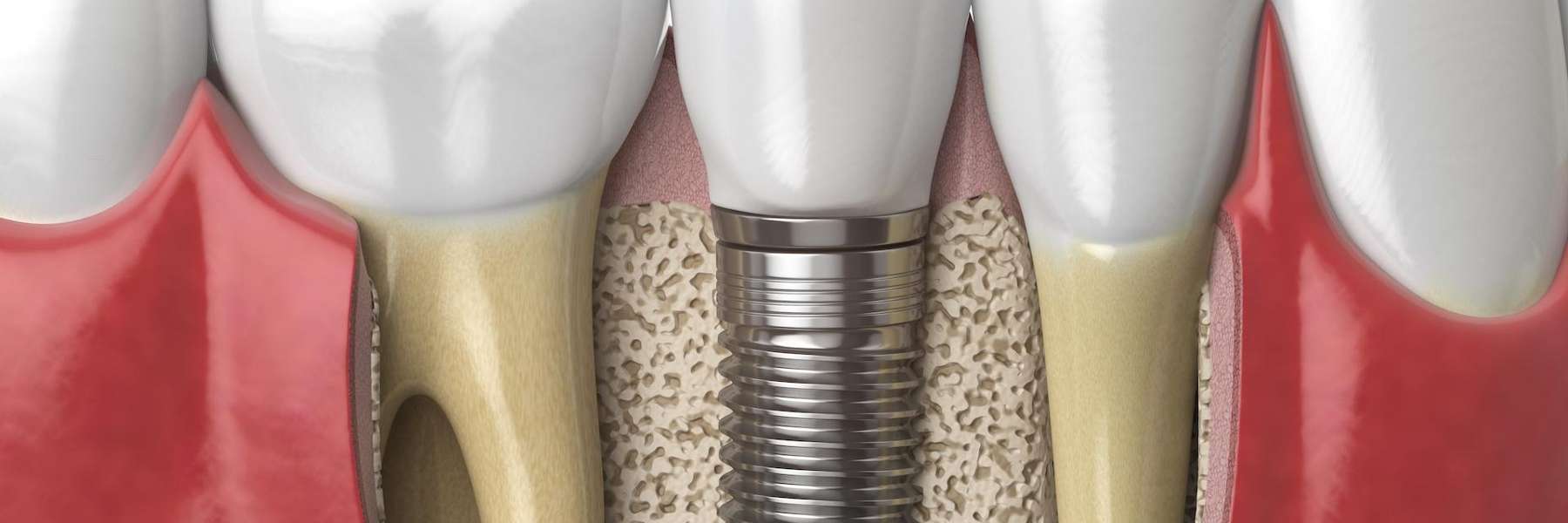
As anyone who’s ever suffered tooth loss has learned, the now-empty space in the mouth where the tooth used to be must be treated in order to prevent future damage and ensure a healthy smile and bite. In these instances, dental implants are the most popular and effective option for suitable candidates.
Today, we’re delving into dental implants to learn what they are, why they’re necessary, why they’re so effective, and what to do after an implant procedure.
What Exactly Are Dental Implants?
Dental implants are small titanium pegs implanted into the jawbone at the site of tooth loss. Once an implant is placed in the empty hole, or “socket” in the jawbone created by tooth loss, it is temporarily sealed and allowed to fuse permanently with the jawbone via osseointegration. Once securely in place, the implant offers a solid anchor point for a replacement tooth (often a dental crown).
Dental implants stand out from other tooth replacement solutions because they address tooth loss above the gumline, at the crown, and at the root. Once an implant is in place, fused, and secure, a porcelain dental crown is secured atop the post as a permanent tooth replacement.
Who’s an Appropriate Candidate for Implants?
Unfortunately, not everyone is a good candidate for implants. Suitable candidates for dental implants should meet the following criteria:
- Have a fully-formed jawbone (this happens around age 18)
- Have relatively healthy gums (and certainly not be suffering from gum disease)
- Have sufficient jawbone density to support a dental implant
What if I’m Not a Suitable Candidate?
If your Middletown, NJ, dentist says you aren’t a suitable candidate for dental implants, there’s still hope! You may be eligible for the following treatments before undergoing a dental implant procedure:
- Bone grafting — A bone grafting procedure can increase your jawbone density. Bone grafting material is added to the area, giving you a stable foundation for dental implants.
- Periodontal treatment — Although gum disease can complicate the dental implant process, your dentist can effectively treat the infection. Once your gum disease has been treated, they can schedule your dental implant surgery.
The Benefits of Dental Implants
Dental implants are considered the gold standard of tooth replacement and offer numerous benefits, including the following:
- Form, function, and aesthetics — Since they’re anchored into the jawbone and look and feel like natural teeth, dental implants have a restorative effect on a person’s self-confidence by restoring their ability and willingness to smile, speak, laugh, bite, and chew.
- Durability — With proper care, a dental implant should last 15 years or more without requiring retreatment. In some cases, with proper care, dental implants can last a lifetime!
- Overall oral health — Dental implants preserve surrounding teeth by keeping them in alignment and safeguarding against the loss of post-tooth loss jawbone density.
Dental Implants Aftercare and Maintenance
Once your dental implant procedure is complete, it’s essential to properly care for them to keep your smile looking its best. You’ll be able to bite down and chew normally and once again eat all your favorite foods. Though dental implants are incredibly durable, they require some care to ensure long-term success.
Follow these immediate dental implant aftercare tips:
- Use ice packs — Apply ice packs to your face for 24 hours to reduce swelling and eliminate discomfort.
- Rinse your mouth — Rinse with warm salt water several times a day for the first few days.
- Avoid activity — Limit any strenuous activity for several days after your procedure.
- Avoid hard foods — Make sure not to chew or bite down in the implant area, and avoid any hard, crunchy foods.
Here are some maintenance tips to help you keep your dental implants for a lifetime:
- Practice good oral hygiene — Brushing your teeth twice a day to remove plaque and food particles is essential. You should also floss daily and use an antibacterial mouthwash.
- Avoid harmful habits — Both smoking and consuming alcohol can slow the healing process, so it’s best to avoid them. Also, don’t bite on ice, pens, or fingernails.
- Visit your Middletown dentist — Be sure to visit your dentist every six months for regular dental check-ups and cleanings.
- Eat a healthy diet — Eating a diet rich in fruits, vegetables, and lean proteins can improve your oral health.
- Stay hydrated — Drinking plenty of water will keep your mouth clean and help you heal faster!
- Use a mouthguard — If you participate in contact sports or know that you grind your teeth while sleeping, wear a mouthguard to prevent unnecessary wear on your implants.
Interested in Dental Implants in Middletown, NJ?
If you’re in the Middletown area and want to know about dental implants, including whether they’re the appropriate tooth-replacement solution for your dental needs and smile goals, contact dentist Dr. Pradeep Sukumar and the Middletown Dental team to schedule a consultation!
You can reach our dental office at (732) 495-4444. We look forward to hearing from you.
